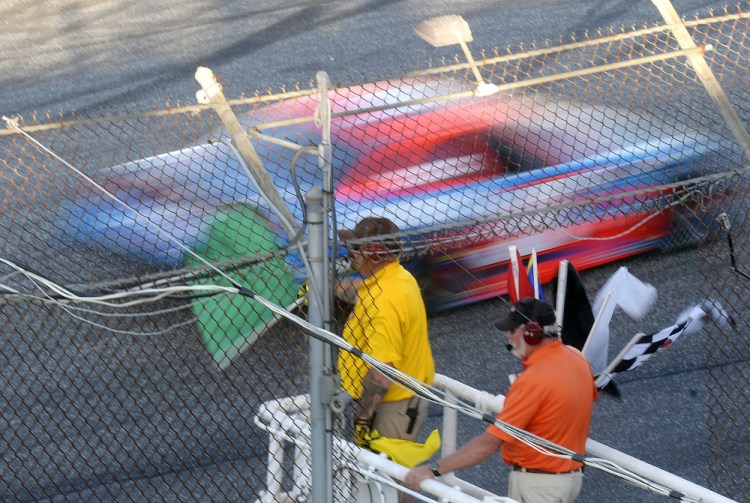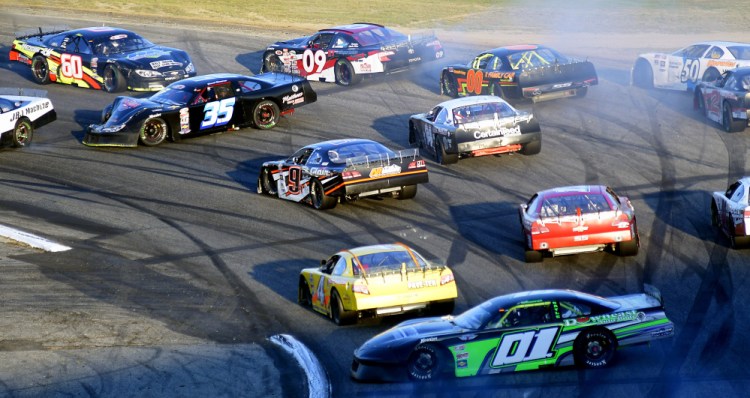OXFORD — One of the significant pieces of any Oxford 250 victory is often found in the pit strategy teams employ. The 44th annual edition of the event on Sunday at Oxford Plains Speedway, however, found itself void of that typical drama.
A rash of caution flags in the first half of the race — 11 of the race’s 17 caution periods came in the first 123 laps — kept all of the early contenders on a nearly identical strategy. With no long stretches of uninterrupted racing early on, teams were simply unwilling to give up track position that fresh tires could have overcome over the course of a 100-lap green-flag run in the middle stages of the race.
“It was so hard to predict anything. After (a bunch) of cautions, you’re thinking, ‘Everybody must be calmed down now. Nope. There’s another one,'” said Reid Lanpher of Manchester, who finished second for the second time in the last three Oxford 250s. “At one point, I asked the guys when do we have to worry about fuel, because we ran a lot of caution laps.”
Teams were allowed 10 tires for the Oxford 250 main event itself, the four tires they started the race on plus six tires they could change at any point.
Typically, teams will make one two-tire stop and one four-tire stop at various points. Some opt for a four-tire stop at or near the halfway mark and a two-tire stop late when the event whittles down to the final half-dozen or so competitors with legitimate shots at winning. Wayne Helliwell Jr. of Pelham, New Hampshire, won the 2016 Oxford 250 with a bit of a reverse strategy — taking only two tires early on and then blitzing through the field following a four-tire stop in the final quarter of the event.
Helliwell tried an early stop on Sunday — he pitted for right side tires on lap 61 — but all of the early cautions didn’t give him any discernible advantage as he remained mired in traffic. Pole-sitter Cassius Clark, who led the first 124 laps, took notice.
“That was the strategy we planned on doing,” said Clark, of Farmington. “Then we thought we were at a little bit of an advantage — we thought we’d make it to (lap) 175 and put four (tires) on and be good, and that’s what we did.”
Only, so did everybody else. Virtually every car in the top 15 pitted under a caution on lap 172. Most all took four tires, and when they restarted in the back half of the top 20, the race became to get through heavy traffic first.
Curtis Gerry’s win could be credited to those first seven laps after the restart — when he went from 14th to third. Clark, Lanpher, Helliwell, Mike Rowe, D.J. Shaw, Derek Ramstrom, Garrett Hall, Johnny Clark and Glen Luce, among many others, were all left to to duke it out amongst themselves.
“We pitted with the guys that beat us,” Cassius Clark said. “There were a half-dozen of us racing three-wide. It was crazy getting back up through. We got by Curtis once, got by (Rowe), it was back and forth. We got spun out there in the middle of one (on lap 197) and lost all our track position and had to fight from the back again. It was unfortunate.”
Helliwell never showed the speed to get back to the front, despite trying to pit out of sequence early on. With so many cars all pitting at once, just over 75 laps from the finish, it became a heads-up Oxford 250 instead of one featuring several drivers riding on varying degrees of tire wear.
Clark, though he finished third, likely lost the most from the lack of a strategy game in this Oxford 250. His final lap of the race was the only sub-16-second lap posted by any car at the end.
“We were going to actually kind of short-pit it and take two rights and then try to come in with 50 to go and put the four on and mow them down,” Clark said. “But really, there were so many cars out there, I don’t think that strategy was going to play out.”
In the end, strategy didn’t play out at all. Perhaps unsurprisingly, the 46-year-old Gerry, of Waterboro — who had been among the fastest two cars in every Friday and Sunday practice session leading into the race — emerged as an Oxford 250 champion.
“I can’t even believe it,” Gerry said. “The last two laps, that was what was going through my mind. ‘I just cannot believe this.’ We had all those cautions right at the end… and I was like, I cannot lose this. I’ve come this far, I cannot lose this.”
Travis Barrett — 621-5621
tbarrett@centralmaine.com
Twitter: @TBarrettGWC
Send questions/comments to the editors.






Comments are no longer available on this story